Inside Israel's game-changing military pivot: Why Tehran should be worried
Israeli military planners are particularly focused on the possibility of multi-front escalation; preparing for scenarios where action against Iran's nuclear program could trigger responses across multiple theaters.

Five hundred days after Hamas's October 7th attack, Israel finds itself prepping for what could be its biggest military challenge yet: a potential strike on Iran's nuclear facilities. Meanwhile, the Jewish state is juggling threats on multiple fronts from Gaza to Lebanon.
Inside sources reveal the IDF is conducting intensive preparations, including intelligence gathering and specialized training, for what one senior defense official calls "the most comprehensive military readiness program" ever developed against Iran's nuclear sites. The preparations come as Tehran exploits reduced international oversight to accelerate its nuclear ambitions.
Adding pressure to an already volatile situation, President Donald Trump has threatened to "open the gates of hell" if Hamas doesn't release remaining hostages. While favoring harsh economic sanctions, Trump has kept military options on the table if Iran approaches nuclear capability during stalled talks.
IRAN CHALLENGE
IDF commanders are working around the clock on force building, intelligence gathering, and operational planning to present decision-makers with effective strike capabilities. Sources say Iran is recalculating its strategy regarding the "rings of fire" it built around Israel. Just last week, Iranian operatives attempted to smuggle funds from Tehran to Beirut to help rebuild Hezbollah's forward positions in Lebanon.
"A nuclear-armed Iran would fundamentally alter regional dynamics," one defense official warned, "providing immunity not just to Tehran but to its entire network of proxy forces."
MULTI-FRONT CRISIS
The Iranian threat emerges as Israel faces complex challenges across the region:
GAZA: Hamas is using reconstruction needs and hostage negotiations as leverage, demanding full control of the Strip including the strategic Philadelphia Corridor. Netanyahu's government appears increasingly "weak" in handling hostage negotiations, with Trump's administration threatening to intervene if Phase B talks don't progress. Despite destroying most of Hamas's tunnel network, weapons arsenals, and production lines, and eliminating numerous militants and senior leaders, the hostage situation remains paramount. Israeli officials warn that without dramatic progress after Phase A's completion, the IDF could resume full-scale operations, potentially triggering renewed missile and drone attacks from Yemen.
LEBANON: Hezbollah has suffered catastrophic losses, including its leader Hassan Nasrallah and most senior military commanders. The IDF has systematically destroyed infrastructure built over two decades, including the group's extensive tunnel network and weapons stockpiles. The Radwan Force's invasion plans were severely disrupted. The IDF refuses to withdraw from southern Lebanon until the Lebanese Army assumes full control and prevents Hezbollah's return to border villages. Recent attempts to smuggle money from Tehran to Beirut for Hezbollah's reconstruction efforts were thwarted. Military analysts question whether Hezbollah would sacrifice its remaining capabilities and Lebanon itself if Israel strikes Iran.
SYRIA: Israel executed a two-phase operation following Assad's regime collapse. Phase one involved rapidly dismantling one of the Middle East's largest armies and eliminating one of the world's densest air defense networks that had protected Iranian bases and Hezbollah supply routes. Phase two established a security buffer zone in Syrian territory to prevent future cross-border raids on Golan Heights communities. While Washington has approved these moves, Israeli commanders remain vigilant as Assad's regime attempts to reconsolidate power.
JUDEA AND SAMARIA: Operation Iron Wall targets multiple hot spots: Jenin, Tulkarm, Qalqilya, Hamsat, and northern Samaria villages including Taysir, Tammun, and Tubas. The operation has three primary objectives: preventing terror groups from using refugee camps as safe havens, destroying terrorist infrastructure and weapons caches, and reducing tensions before Ramadan despite Iran's increased funding for attacks against Israeli civilians and soldiers. The IDF has intensified training, reinforced defensive positions, and prepared for extreme scenarios following October 7th lessons.
JORDAN: King Abdullah II's domestic situation has become precarious following Trump's declaration that Jordan should absorb Gaza Palestinians. During his Washington visit, the king appeared visibly uncomfortable with these statements. Israeli security officials are particularly concerned about weapons smuggling routes from Jordan fueling Palestinian militant operations in the West Bank. The Defense Ministry is developing a new security fence and creating a dedicated eastern division to address these emerging threats.
PREPARING FOR ESCALATION
The IDF has revamped its capabilities since October 7, implementing significant adjustments in force protection, intelligence gathering, and rapid response protocols. The Defense Ministry is developing new security measures, including advanced barriers along the Jordanian border and forming a new eastern division for emerging threats.
PEACE REMAINS ELUSIVE
While claiming significant victories against Hamas, including destroying tunnels and eliminating leaders, Israel has yet to achieve what officials call "absolute victory." The Netanyahu government faces mounting pressure over its handling of hostage negotiations, with Phase A nearing completion but Phase B looming as potentially more complex.
Walla contributed to this article.